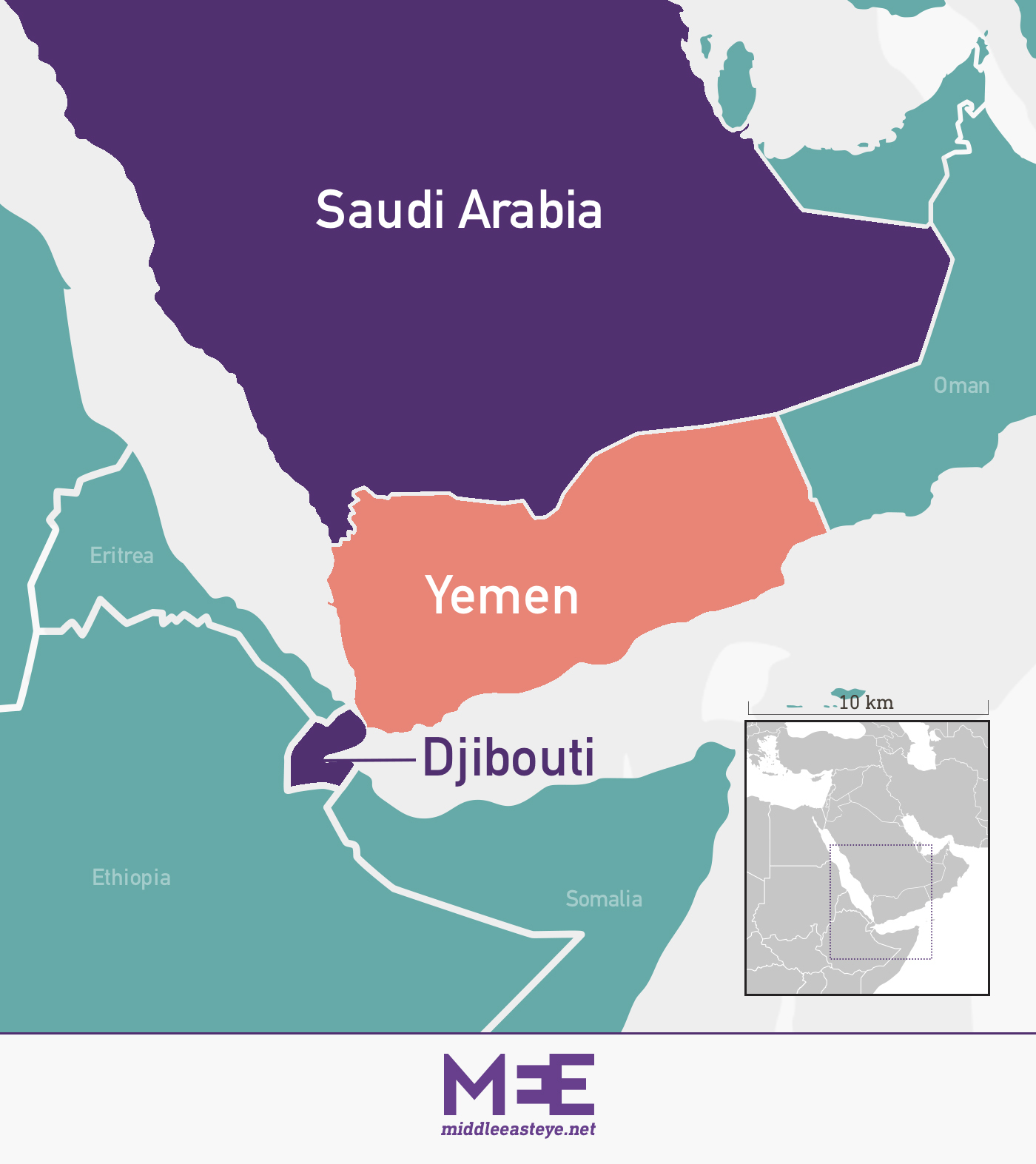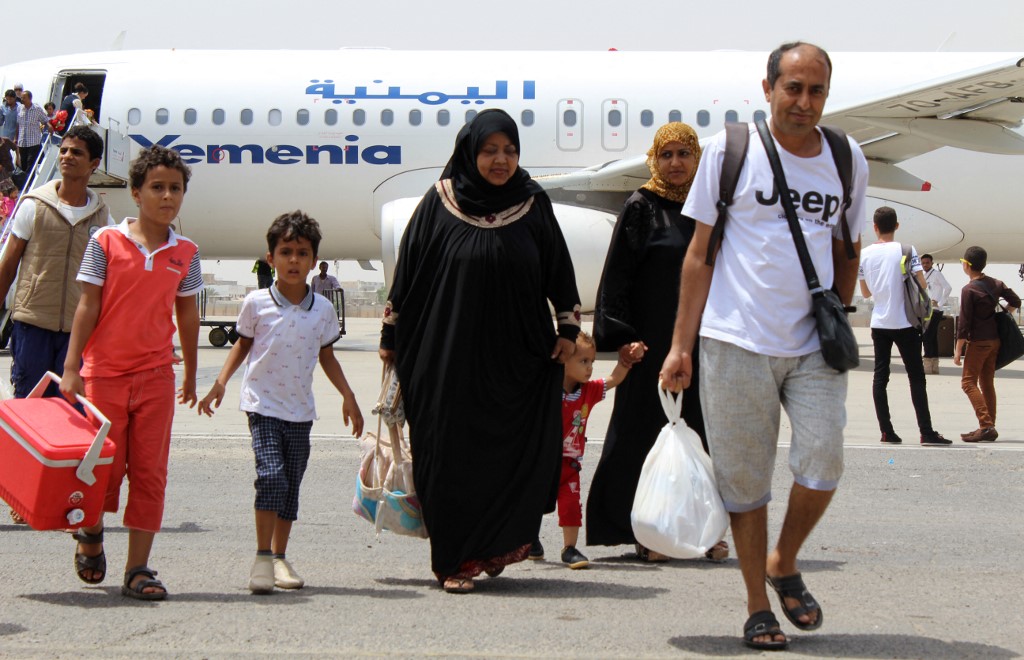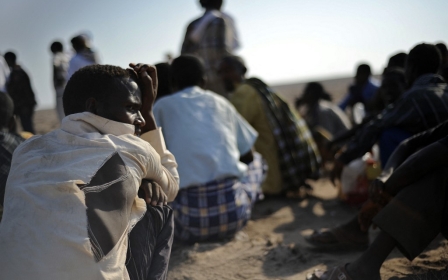Yemenis forced out of Saudi Arabia find a new refuge in Djibouti

Nabil spent 14 years as a Yemeni expatriate in Saudi Arabia - but his life dramatically changed in 2019, when the Gulf kingdom began imposing restrictions on foreign workers, including fees on dependents, which forced him to send his family back to their home country.
Nabil, who asked not to give his surname for fear of retributions, remained in Saudi Arabia on his own, working in a store selling DIY products. But soon afterwards, he could no longer afford to pay the money he owed to Saudi authorities and his sponsor.
“There are a lot of restrictions and fees. The fees have increased while salaries have been reduced... nothing is left to send to our families in Yemen,” the 41-year-old told Middle East Eye.
In recent years, Saudi authorities have imposed new restrictions and charges on expatriate workers as part of its Saudisation efforts, including Yemenis, prompting thousands of them to return home.
Upon returning to Yemen, however, many have found their country in ruins after years of conflict, with no job opportunities to help them survive.
New MEE newsletter: Jerusalem Dispatch
Sign up to get the latest insights and analysis on Israel-Palestine, alongside Turkey Unpacked and other MEE newsletters
Many have since begun looking towards the Horn of Africa, especially Djibouti, as the second best choice after Saudi Arabia. Located across the Gulf of Aden, southwest of Yemen, Djibouti is seen as both accessible and offering plenty of work.
While Riyadh was often seen as the preferred destination, a significant number of Yemenis were living in Djibouti even before the Saudi-led offensive on Yemen began in 2015.
Saudisation leaves Yemenis stranded
Public opinion on Saudi Arabia seems to be shifting in Yemen, however.
Nabil attributes his difficult situation to the so-called "Saudisation" drive, the economic policy whereby Saudi companies are required to staff their workforce with a majority of Saudi nationals.
He believes the new restrictions and costs are an attempt to force immigrants to leave the country.
Saudi Arabia introduced a fee in July 2017 requiring foreign workers to pay 100 Saudi riyals ($27) per month for each of their dependents living in the country. The fee doubled to SAR200 ($53) a month in 2018, then SAR300 ($80) in 2019. It is slated to reach SAR400 ($106) in 2021.
In January 2018, the kingdom also began charging companies a monthly fee of SAR400 for each foreign worker they hire. Firms that employ an equal or greater number of Saudis than expats paid SAR300.
The monthly fee increased to SAR500-600 ($133-160) per worker in 2019, and is slated to rise to SAR700-800 ($186-213) per worker in 2021.
Nabil left Saudi Arabia for Yemen in early 2021 and tried, unsuccessfully, to look for a job back home. He then decided to travel elsewhere in order to find a source of income to provide for his family.
“Some friends already had chosen Djibouti and started to work there, because they knew some Yemenis who had been in the country for decades,” Nabil said.
“In fact, Djibouti wasn't a choice for me in the past... Its infrastructure and the whole environment isn’t as good as Saudi Arabia. So I didn’t dream of going there.”
But Nabil thought it over and realised that the only other alternative was remaining unemployed. So in April, he decided to leave to go to Djibouti with some other friends who had also decided to leave Saudi Arabia.
“We started a new job experience - similar to what we did in Saudi Arabia.”
An accessible country
Working in Djibouti was better than what Nabil had expected, as he met many fellow Yemenis who helped him make the transition.
“Djibouti is a small country and its population isn’t rich. However, the income is enough, and we don’t need to pay any expat fees,” he said.
A major obstacle, though, has been learning the local languages. While Arabic and French are the official languages of Djibouti, Somali and Afar are the most commonly spoken.
“I thought that I would communicate with people in Arabic, but few can understand me. So I’m still struggling. I’m doing my best to learn the language,” Nabil said.
He added that he is planning to start his own business in Djibouti, saying that it was easier to launch a start-up there than in Saudi Arabia.
“I advise jobless people in Yemen, both the former expats in Saudi Arabia and others, to try and travel outside Yemen. Djibouti is a good choice.”
Khalid Fadhel, 39, another Yemeni expat who spent eight years in Saudi Arabia and returned last year to Yemen, said that Djibouti may not be the best destination, but it is the most accessible.
To get to Djibouti, Yemeni travellers need around $300 for a visa and transport. However, they also need someone in Djibouti to help them find a job, otherwise they will struggle, Fadhel warned.
But not all Yemenis move to Djibouti for business. There are 5,129 Yemenis in Djibouti, according to the UN refugee agency UNHCR, half of whom live in the Markazi refugee camp in the northern port city of Obock.
The camp residents tend to be the most vulnerable: the elderly, for example, or people with disabilities, according to the Internal Displacement Monitoring Center (IDMC).
“Not all Yemenis live comfortably in Djibouti. Those who don’t know people in Djibouti end up in the camp in Obock or struggle to find a place in the city,” Fadhel said. He explained it was easy for him to settle in Djibouti because he had contacts, and because of his years of experience working as an electrician in Yemen and Saudi Arabia.
Before 2015, Yemenis used to enter Saudi Arabia illegally with the help of smugglers. But since the beginning of war between Houthi rebels and the Saudi-led international coalition, the border between Saudi Arabia and Yemen has effectively sealed shut.
Now, Yemenis increasingly seek to travel to Djibouti by crossing the narrow Bab al-Mandeb strait. In April 2021, dozens of Yemenis died at sea while trying to cross over to Djibouti undocumented.
Djibouti has changed
Ahmed Al-Qershi, a Yemeni expat in his 60s living in Djibouti for more than 20 years, stated that Djibouti today is different from Djibouti before 2015.
“Before the war, Yemenis preferred to seek refuge in Saudi Arabia. Only a few sought out Djibouti because they had relatives working there. I was one of them,” he told MEE.
Qershi’s father and many relatives have been working in trading in Djibouti for decades. They learned the required languages to deal with their customers, which made their integration smoother.
“We are traders and usually export goods from Yemen to Djibouti. We have a successful textile shop,” he added.
He added that some Yemenis heard about traders in Djibouti and thought they would become rich from the day they arrive. “During the last five years, many Yemenis have been entering Djibouti but there have been no job opportunities for all of them, so many ended up unemployed,” he said.
“Djibouti isn’t like Saudi Arabia. In Saudi, you can work from the first day you arrive, here you need time to learn the language and understand the work well,” Qershi said.
One paradox the longtime resident of Djibouti has noted is the flux of migration in either direction across the 30-kilometre wide Bab al-Mandeb strait.
“Djibouti gathers refugees from Yemen and the Horn of Africa. I hear from African refugees that they aim to travel to Yemen and then to Saudi Arabia, while Yemenis want to go in the opposite direction and travel to Ethiopia and then on to other countries,” Qershi added. “Everyone thinks from their point of view. We hear about African refugees in Yemen and we hear about Yemeni refugees in Africa.”
Qershi believes that it is the war that made Yemenis leave their country as refugees and not as expatriates.
“Before 2015, Yemenis didn’t favour Djibouti, and there was almost no unemployment among Yemenis in Djibouti. But it is the mass exodus to the country that made some Yemenis stay jobless.”
Middle East Eye delivers independent and unrivalled coverage and analysis of the Middle East, North Africa and beyond. To learn more about republishing this content and the associated fees, please fill out this form. More about MEE can be found here.







